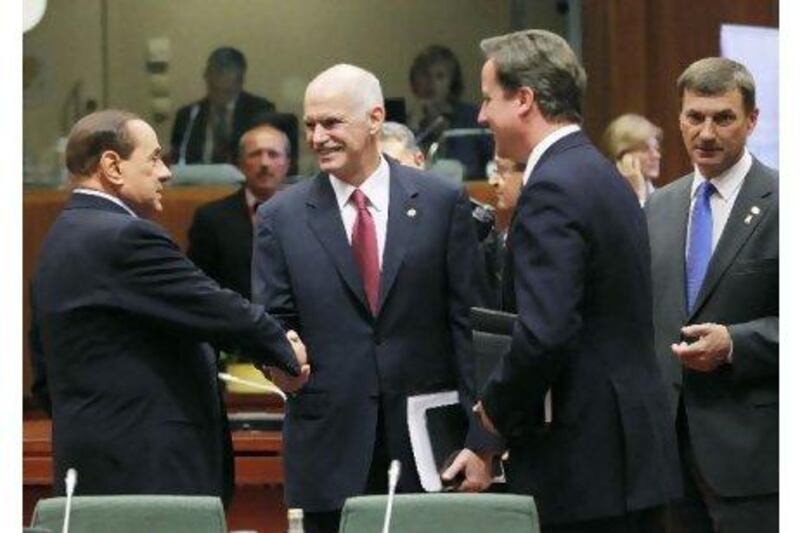BRUSSELS // Pledging to do whatever it takes to stabilise the euro economy, EU leaders vowed to stave off a Greek default as long as George Papandreou, the prime minister, pushes through a package of budget cuts next week.
"We have agreed that there will be a new programme for Greece," Angela Merkel, the German chancellor, told reporters before the final session of an EU summit in Brussels yesterday. "This is an important decision that says once again we will do everything to stabilise the euro overall."
Greece's next hurdle is to shepherd €78 billion (Dh409.77bn) of austerity measures through parliament, after Thursday's endorsement of the programme by experts from the European Commission, the European Central Bank and the IMF.
Europe's latest attempt to stem the debt crisis came after bonds of debt-strapped euro nations slumped and officials in the US and China warned that the euro area's failure to restore confidence threatened the world economy.
Mr Papandreou called the commitment to a new three-year aid programme "not only a green light but also a positive sign for the future of Greece".
The summit ended yesterday with leaders facing a potential last-minute hitch over the final approval of Italy's Mario Draghi as the next president of the ECB, but Mr Draghi was confirmed. Nicolas Sarkozy, the French president, had been pressing another Italian on the ECB's board, Lorenzo Bini Smaghi, to step down two years before his term ends to make way for a French replacement.
Mr Sarkozy was backed into a corner by a draft statement, prepared overnight, that included the appointment. Mr Draghi is slated to take over the ECB from Jean-Claude Trichet on November 1.
Thursday's discussions were dominated by Greece, which is drawing on €110bn of loans pledged last year. The leaders paired their show of solidarity with pressure on the Greek opposition party to fall in line with the savings programme.
The opposition leader Antonis Samaras refused to commit in meetings with fellow European conservatives in Brussels. While backing budget cuts, he lashed out at the "current policy mix" for too much reliance on tax increases.
The euro headed for a third straight weekly drop against the dollar amid concern over the outcome of the Greek crisis. Greek bonds fell, driving the 10-year yield to almost 17 per cent.
Mr Papandreou offered an assurance that he would deliver the budget cuts demanded in exchange for the €12bn instalment of emergency loans due next month and a new rescue package, a Greek government official said.
Speaking of "difficult and worrisome days", Herman Van Rompuy, the EU president, said Greek belt-tightening was "absolutely necessary to restore confidence and over time foster economic growth".
Already at a European record of 142.8 per cent of GDP, Greek debt will rise to 166.1 per cent of GDP next year, the EU predicts. The effort to cut a budget deficit that is about 10 per cent of GDP has helped deepen a third year of recession.
In Athens, Evangelos Venizelos, the finance minister, who has been in office since a June 17 cabinet revamp, yesterday announced measures including a 5 per cent tax on legislators' incomes, a levy on self-employed professionals and a reduction in the tax-free income allowance. Greek legislators will vote on the package on Thursday, in time for a July 3 meeting of European finance ministers to agree to pay the next instalment of aid.
Greece needs to cover about €4bn of bills maturing between July 15 and July 22 and faces about €3bn of coupon payments in the month, according to Bloomberg calculations. A bigger test comes on August 20 when it must redeem €6.6bn of bonds.
Mr Papandreou said a European commitment to aid Greece would make it easier for him to sell the Greek people on austerity measures that have provoked strikes and riots.
"If there is a strong commitment from the European Union, there will be a strong commitment from Greece," Mr Papandreou said.
The EU sweetened the offer by pledging to increase its contribution to Greek infrastructure projects and provide more "technical assistance" to enable the Greek government and companies to tap European subsidies.






